ON THE RECORD: MXA’S 2004 250 TWO-STROKE MOTOCROSS SHOOTOUT
YOU ARE EITHER A TWO-STROKE GUY OR YOU AREN’T
And, if you could care less about the RM250, YZ250, CR250, KX250 and 250SX—you are a bonafide, freshly minted four-stroker. More power to you. But, any true-to-life two-stroke gunslinger abhors the sound of a thumper. As with longboard surfers, drive-in theater owners and hot rodders (especially those with rat rods), the riders of 250cc two-strokes are the last bastion of the grand old days. As the world veers towards a four-stroke future only the hardest of the hard-core are left to fight the good fight.
The MXA wrecking crew spent the last few months racing (not play riding or practice riding) the five best 2004 250cc two-strokes made. Here is what we have learned—use it for your own good.
FIRST PLACE: 2004 SUZUKI RM250
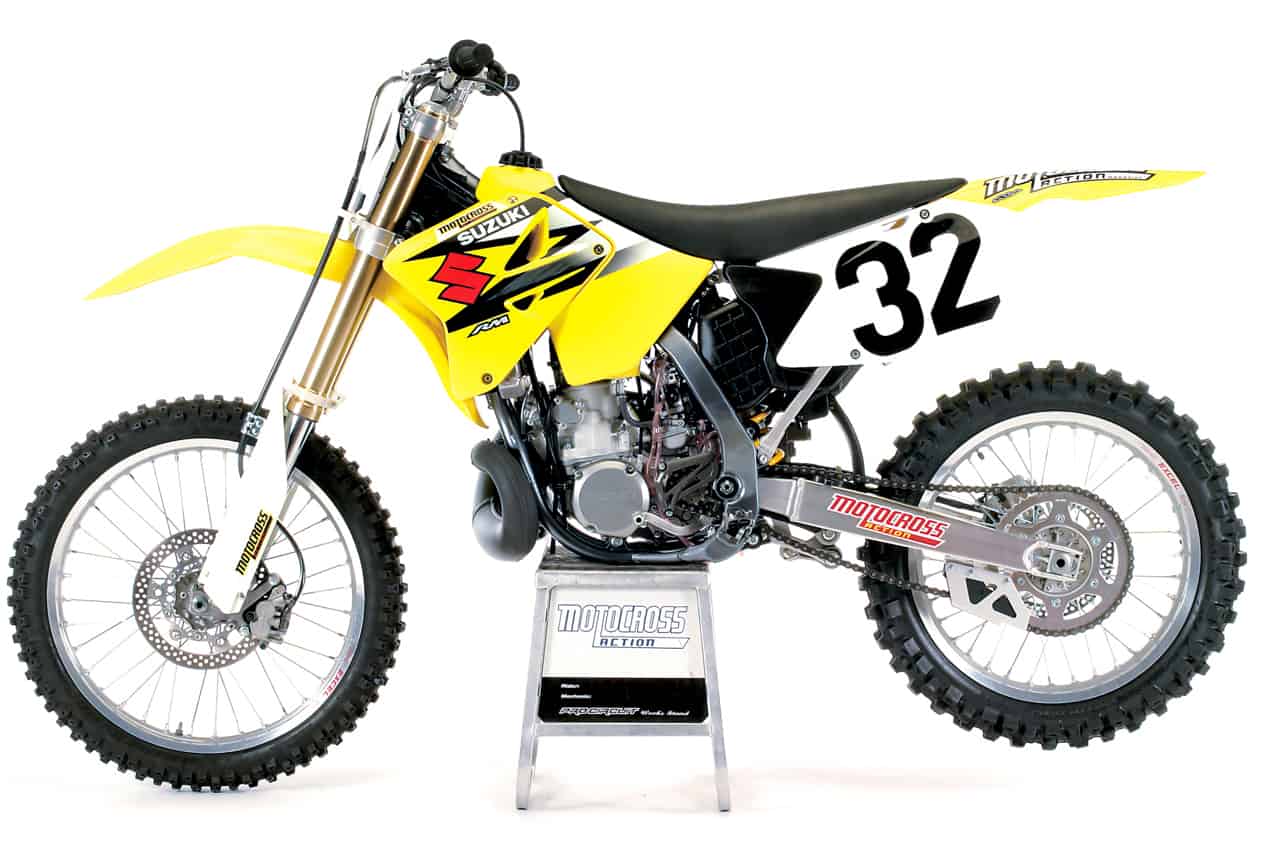 The best in its class—because it epitomizes what’s fun about two-strokes.
The best in its class—because it epitomizes what’s fun about two-strokes.
There is no greater expression of two-strokedom than the 2004 Suzuki RM250. It is snappy, barky, agile, quick, light and aggressive–in essence, everything a four-stroke isn’t. The Suzuki’s instant response at the throttle and handlebars makes it the most fun to ride. It turns tighter than anything made. We like the quick power, accurate steering, powerful front brake and great shock. We could live without the erratic clutch, touchy rear brake and rim-saver rubber.
SECOND PLACE: YAMAHA YZ250
The 2004 Yamaha YZ250 could have stood on the top step of the 250 shootout podium just as easily as the RM250. It has better forks, more stable handling, superior reliability, preferable tires, a clockwork-like clutch and the broadest powerband in the class. And, it’s no secret that the RM250 engine is a direct copy of the YZ. So why isn’t the Yamaha first? That’s simple: Yamaha played it safe. With the exception of the powerband, Yamaha didn’t take any chances in 2004. Everything is good, but we wanted to be dazzled.
THIRD PLACE: HONDA CR250
 Great bike, not so great engine.
Great bike, not so great engine.
Honda has built the best 250 two-stroke ever made–except that they forgot the engine. Honda’s engineers set out to fix the CR250’s weirdly sluggish low-to-mid transition, but they failed. Had they succeeded, the CR250 might have ranked two places higher. They didn’t and it doesn’t. Whether the problem lies in the electric power valve, case-reed induction or massive crankcase volume, no one knows. But, the low-end throttle response of the CR250 is disappointing.
FOURTH PLACE: KTM 250SX
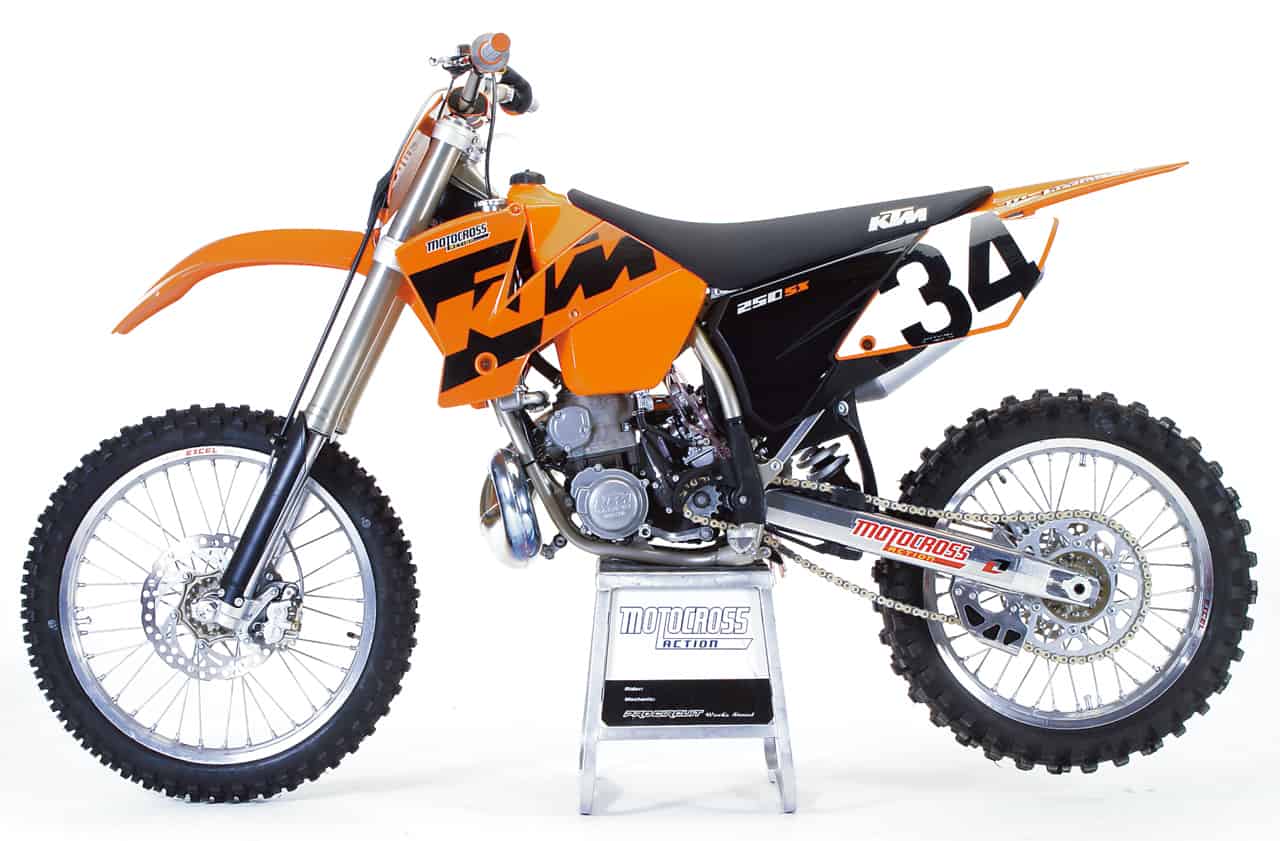
Like a missile without a guidance system.
The missing piece of the KTM 250SX puzzle is the handling. The Austrians either cannot or will not fix the slack steering. As with the Honda CR250’s erratic powerband, the single fly in the KTM’s ointment is its sluggish handling. It downgrades the KTM 250SX at least two spots in the shootout. The rest of the KTM 250SX has been improved immensely. The new powerband is strong and broad, although it could use more top. This is a bike that could be loved–if the KTM engineers showed it some love.
FIFTH PLACE: KAWASAKI KX250
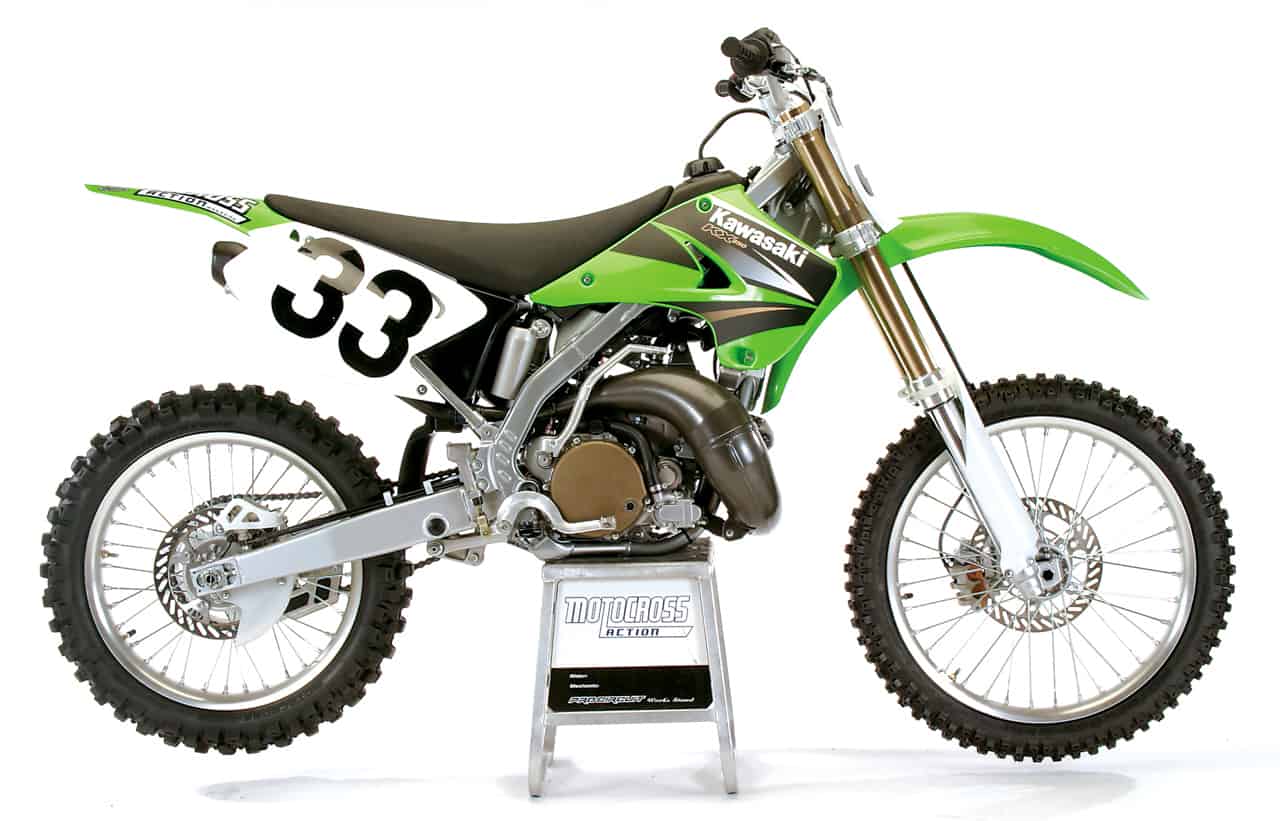
An assemblage of miscellaneous parts more than a unified design.
The MXA wrecking crew wants to like the 2004 KX250. It is obvious that Kawasaki worked overtime to make it a better machine than it was in 2003. But, there was just too much to do in one year. They gave it more horsepower, but it’s still way down on power. They improved the suspension, but it doesn’t jibe with the chassis. They sweated the details, but the whole package is disjointed.
2004 MXA 250 SHOOTOUT DETAILS
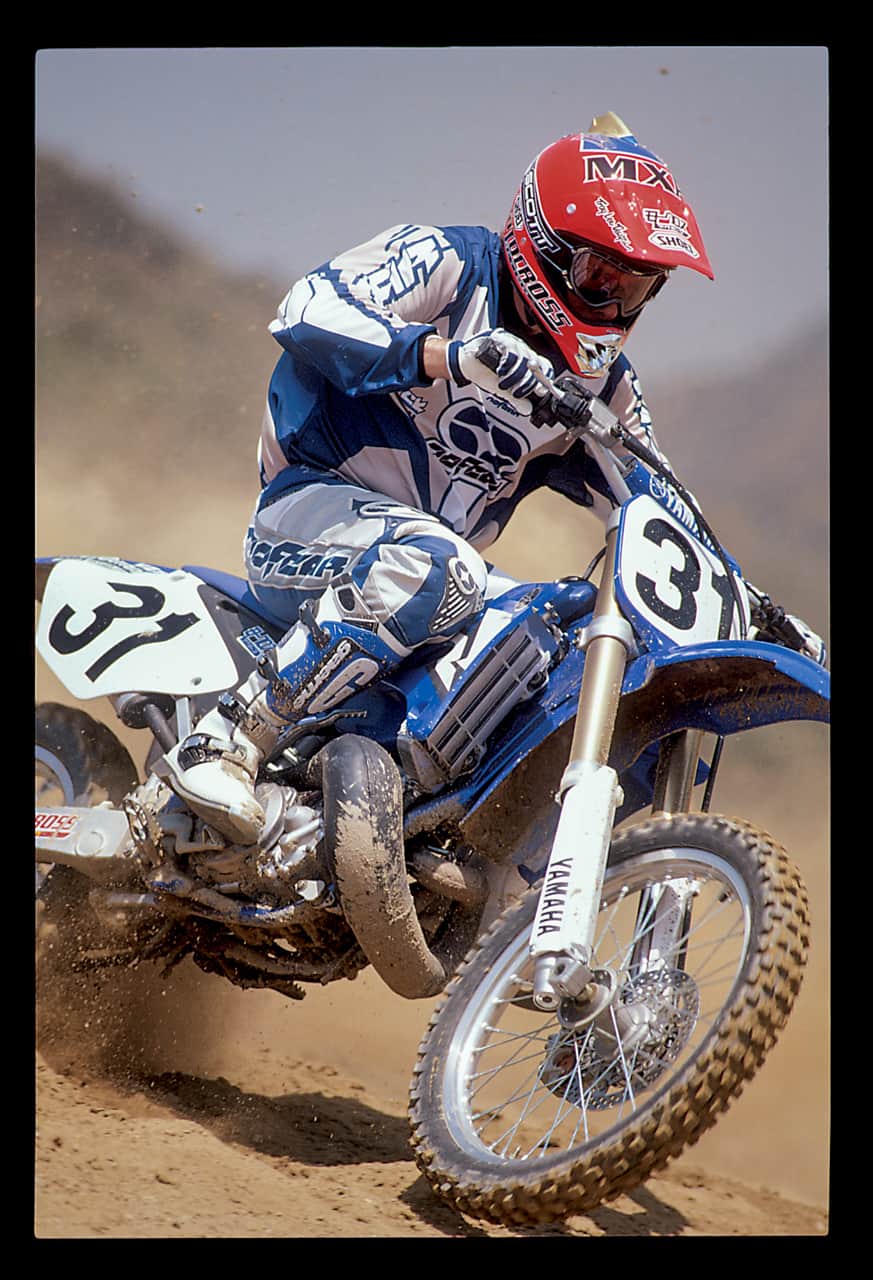
2004 Yamaha YZ250.
Q: WHICH ONE HAS THE BROADEST POWERBAND?
A: Yamaha. The 2004 Yamaha YZ250 has the most usable powerband. It comes on strong right off idle, pulls through a solid middle and never gives up (at least not until its competition is wheezing). It makes the most bottom and the most top. That combination is hard to beat.
Q: WHICH ONE HAS THE MOST RESPONSIVE POWERBAND?
A: Suzuki. The RM250 has unbelievable throttle response. It’s quick, snappy and instantaneous. It doesn’t have the torquey low-end of the YZ, nor is it as hooked up, but it jumps when you say “jump.” Very admirable.
Q: WHICH ONE HAS THE WORST POWERBAND?
A: Honda. As every CR250 owner knows, the low-end response of the CR250 is seriously hampered by the engine’s tendency to go “wah, wah, wah.” The CR’s irritating habit of hanging at one rpm range, without picking up, makes the CR250 harder to ride than the other four 250s.
Q: WHICH ONE HAS THE BEST POWERBAND?
A: A push between the RM250 and YZ250. But, both bikes reach their zeniths with completely different approaches. It should be noted that these two engines use almost identical cylinders.
YZ250: Yamaha’s take on two-stroke power is almost four-stroke-ish. It delivers its power with a hooked-up, tractable, broad and metered power output. It gets the job done by putting every ounce of power it makes into the ground. It is the most impressive.
RM250: Suzuki’s power output is decidedly two-stroke. It’s snappy, responsive and quick. It snaps to attention, rushes towards its peak and jolts the RM into action. It’s hyper. Not as broad as the YZ, the RM gets the job done with dispatch. It is the snappiest.
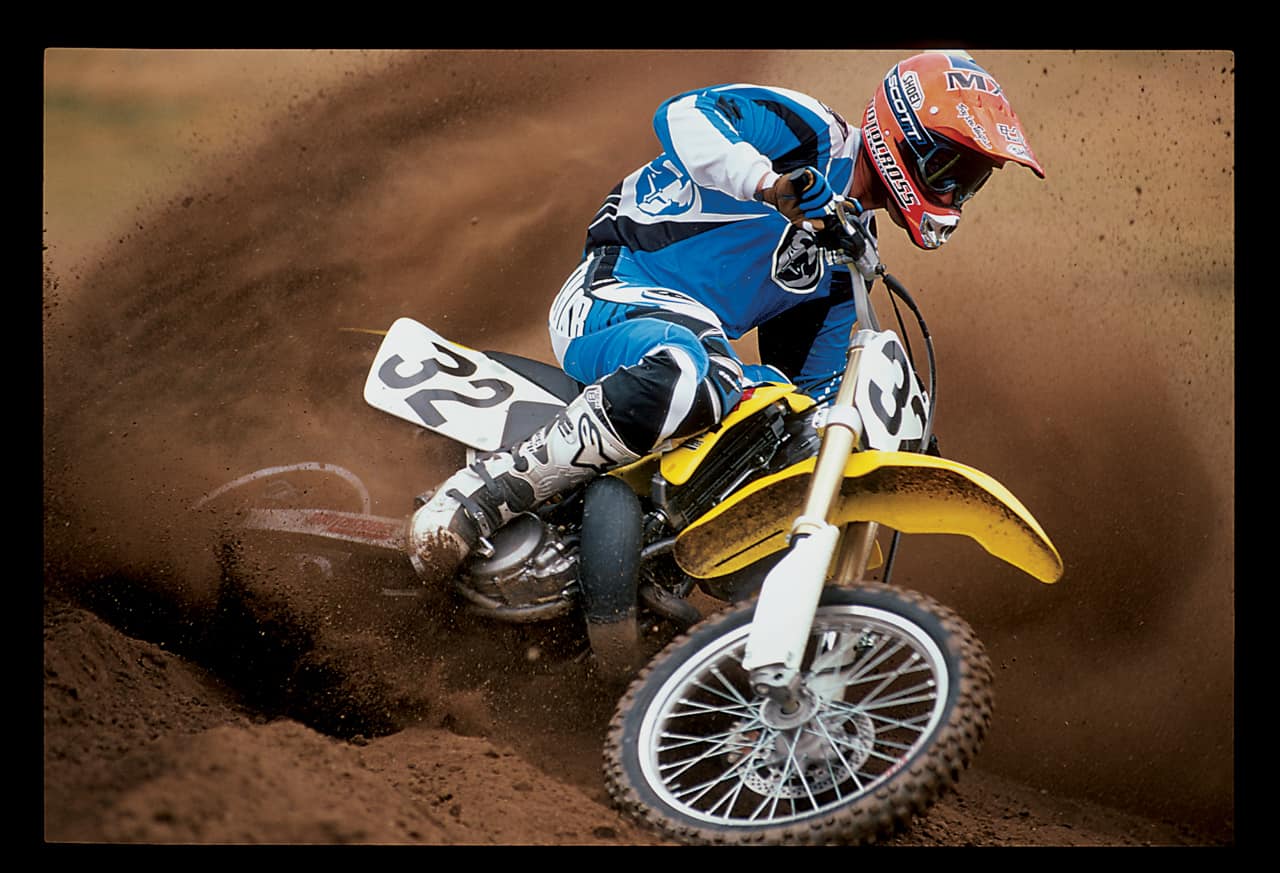 2004 Suzuki RM250.
2004 Suzuki RM250.
Q: HOW WOULD WE RATE THE FIVE POWERBANDS?
A: Suzuki and Yamaha are tied for first (depending on your personal taste in power delivery). KTM is an easy third—and not more than a hair behind the RM and YZ in overall power (although it needs more top-end). Kawasaki is fourth, largely because it doesn’t produce either enough power or a broad enough spread of it. Honda’s weird low-end throttle response is an acquired taste.
Q: WHICH BRAND HAS THE BEST FORKS?
A: Yamaha. The YZ250’s 48mm Kayaba forks win this category with old-school bottoming cones and real-world spring rates.
Q: WHICH BRAND HAS THE BEST SHOCK?
A: Suzuki. Awesome is the best word to describe the RM250’s rear suspension. No other bike comes close.
Q: WHICH BRAND HAS THE BEST OVERALL SUSPENSION?
A: Suzuki. Followed closely by Yamaha, Honda, Kawasaki and KTM.
Q: WHICH BRAND HAS THE BEST BRAKES?
A: Suzuki. We downgraded the YZ250 for its front brake routing, the CR250 for its heat-prone rear brake, the KX250 for its middle-of-the-road stopping power and the KTM for a touchy rear brake.
Q: WHICH BIKE HAS THE BEST GEARBOX?
A: A push between the Yamaha and the Suzuki. This would have been a Yamaha gimme a year ago, but, for 2004, Suzuki stiffened up the shift detent spring so that the RM wouldn’t accidentally self-shift.
Q: WHICH BIKE HAS THE WORST GEARBOX?
A: The Honda. The upshift from second to third can be a dicey affair if you don’t back off or use the clutch. Second worst? Kawasaki. It doesn’t like to shift under a full load. Middle of the pack? KTM.
Q: WHICH BIKE HAS THE BEST CLUTCH?
A: A push between the Yamaha and the Honda. This is a default category for the other three brands.
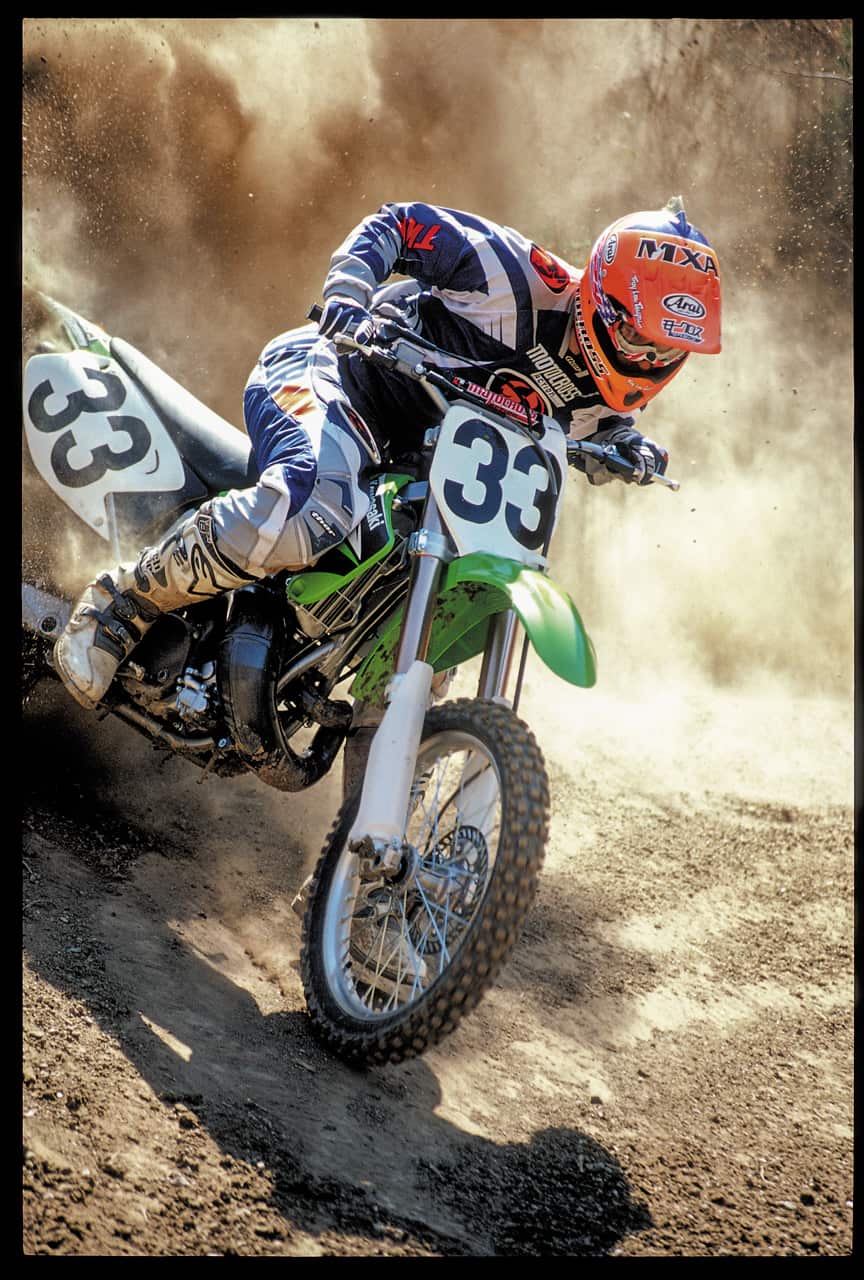
2004 Kawasaki KX250.
Q: WHICH BIKE HAS THE WORST CLUTCH?
A: The Suzuki. It lurches into action.
Q: WHICH BIKE HAS THE BEST AIR FILTER?
A: A push between the Yamaha, Suzuki, Kawasaki and KTM. The YZ, RM and KX have Plain Jane filters, but they work. The KTM filter doesn’t need tools to get to, but seems a little baggy.
Q: WHICH BIKE HAS THE WORST AIR FILTER?
A: The Honda. Honda loses this category because their filter barely fits into their airbox. It is easy to misalign it and prone to allowing dirt to fall down the intake.
Q: WHICH BIKE HAS THE BEST HANDLEBARS?
A: A push between the Honda and the KTM. Both come with aluminum bars (KTM uses oversized bars and Honda uses regular bars).
Q: WHICH BIKE HAS THE BEST TIRES?
A: It all comes down to terrain.
Intermediate dirt: Honda has a good all-around intermediate setup with its Dunlop D742/756 combo (although the front leans to the harder side of intermediate dirt).
Hardpack: Yamaha opted for hard-to-intermediate terrain with the Dunlop K739 combo.
Soft terrain: KTM went for soft terrain tires with its old-school Bridgestone M59/M70 tires.
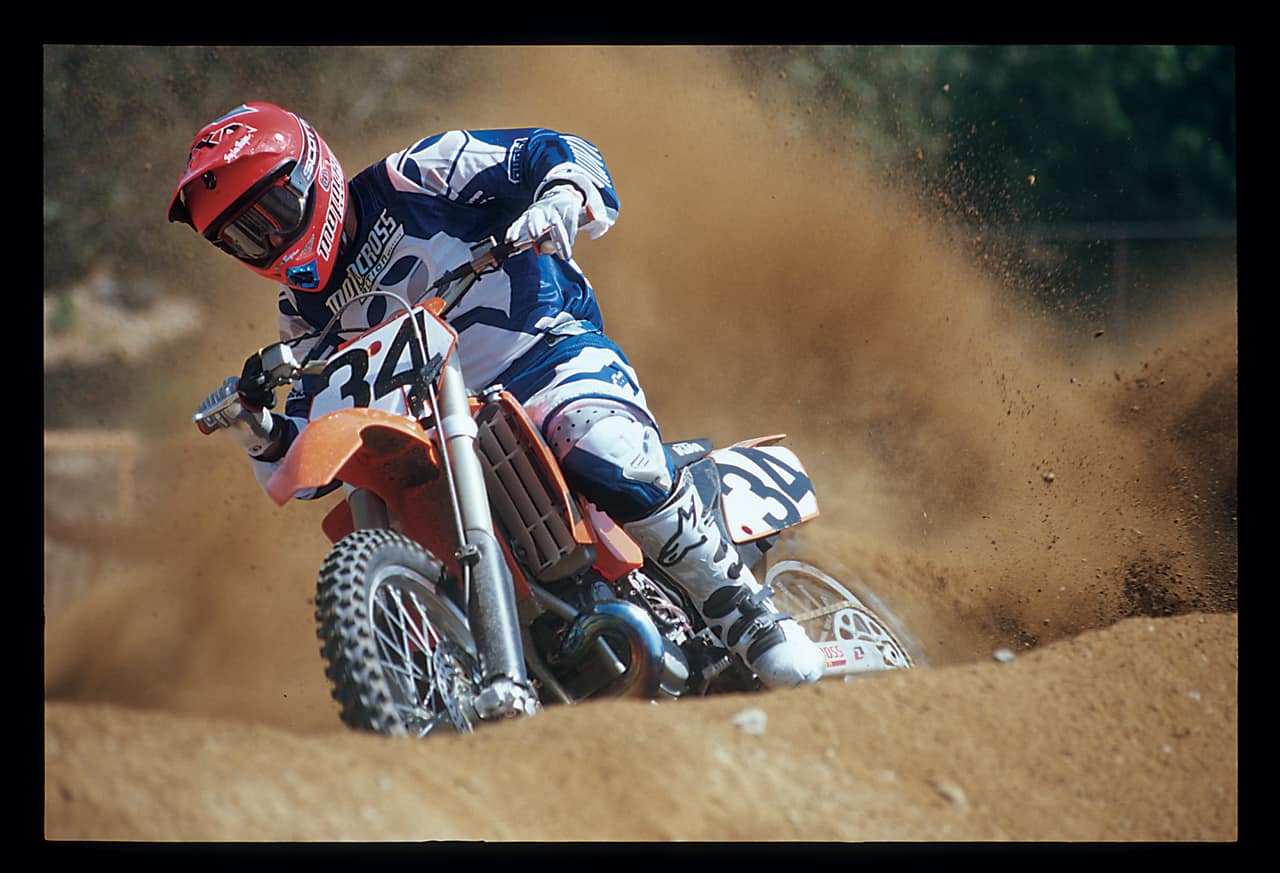 2004 KTM 250SX.
2004 KTM 250SX.
Q: WHICH BRAND HAS THE WORST TIRES?
A: Suzuki and Kawasaki. The KX and RM might as well wrap their rims in whale blubber, because the Bridgestone 601/602 hard track tires are not top-rate (except on concrete).
Q: WHICH BIKE HANDLES THE BEST?
A: A push between the Yamaha and the Suzuki. But, both bikes cavort around a track with completely different approaches.
YZ250: The YZ250’s geometry isn’t quick or agile, but it is very predictable. It tracks straight as an arrow, turns-in with minimal over or understeer, doesn’t do anything questionable and is supremely stable in the rough.
RM250: The Suzuki has pizzazz. It’s ultra-quick, very agile and amazingly responsive. Once you put real tires on it, the RM250 steers on a razor’s edge. Nothing turns as well as an RM. Its only down sides are its tendency to oversteer and suffer headshake at speed. For two-stroke purists, the Suzuki’s handling is the most unlike a four-stroke.
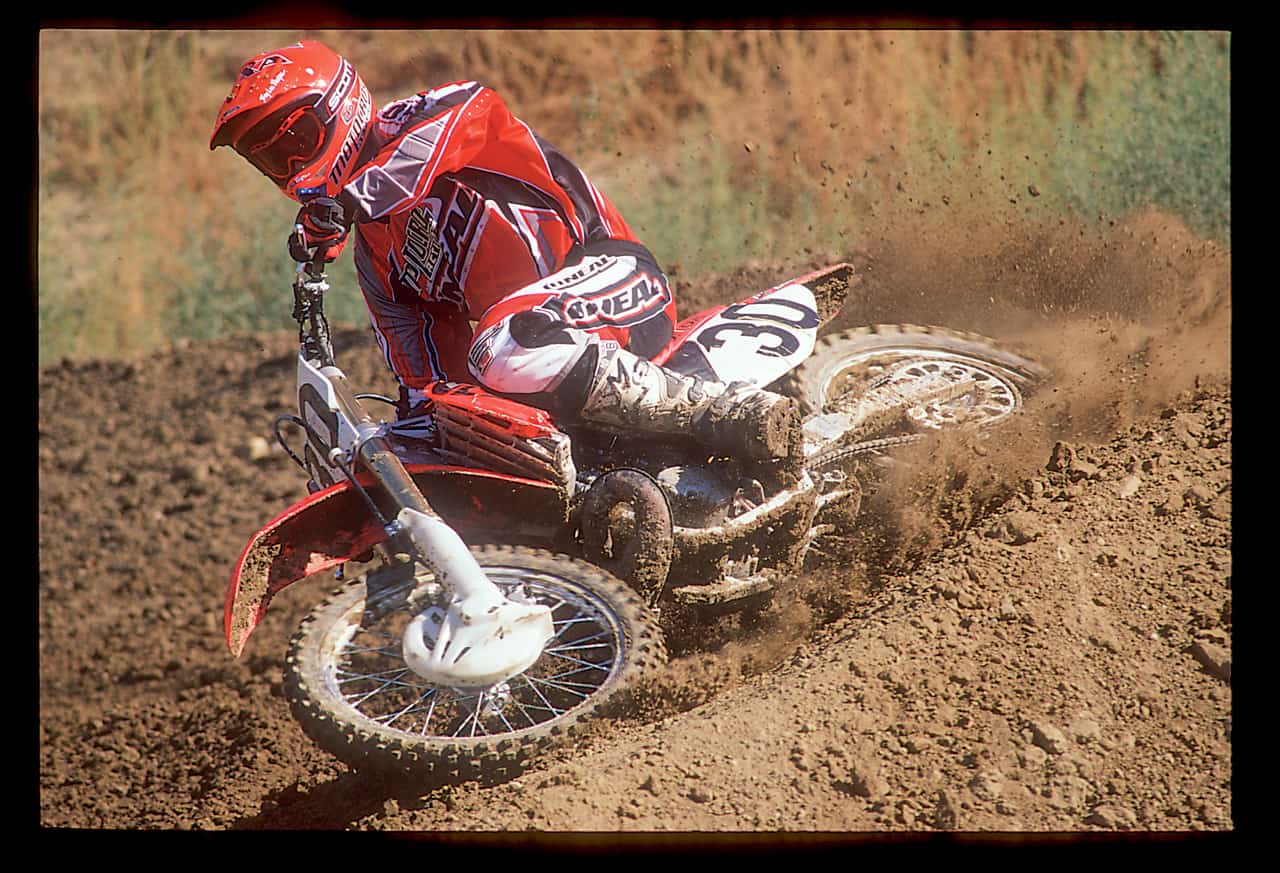 2004 Honda CR250.
2004 Honda CR250.
Q: WHICH BIKE HANDLES THE WORST?
A: The KTM. It has a serious push in the front end that causes it to understeer. You turn—it doesn’t.
Q: WHAT IS EACH BIKE ALL ABOUT?
Here is a quick thumbnail sketch of what we really think about the five 250 two-strokes.
Suzuki RM250: For all the RM owners who wished for a Yamaha engine in a Suzuki frame, the 2004 RM250 is wish fulfillment.
Yamaha YZ250: A great powerband mated to a no-frills chassis. It’s good because it doesn’t do anything bad.
KTM 250SX: A great engine bolted into an albatross of a frame. It doesn’t turn—enough said.
Kawasaki KX250: Kawasaki made major improvements for 2004, but this is just an average bike with below average horsepower.
Honda CR250: The suspension hangs down a little and the geometry has some push, but if the CR250 had low-end, it would be twice as good. Unfortunately, it doesn’t.



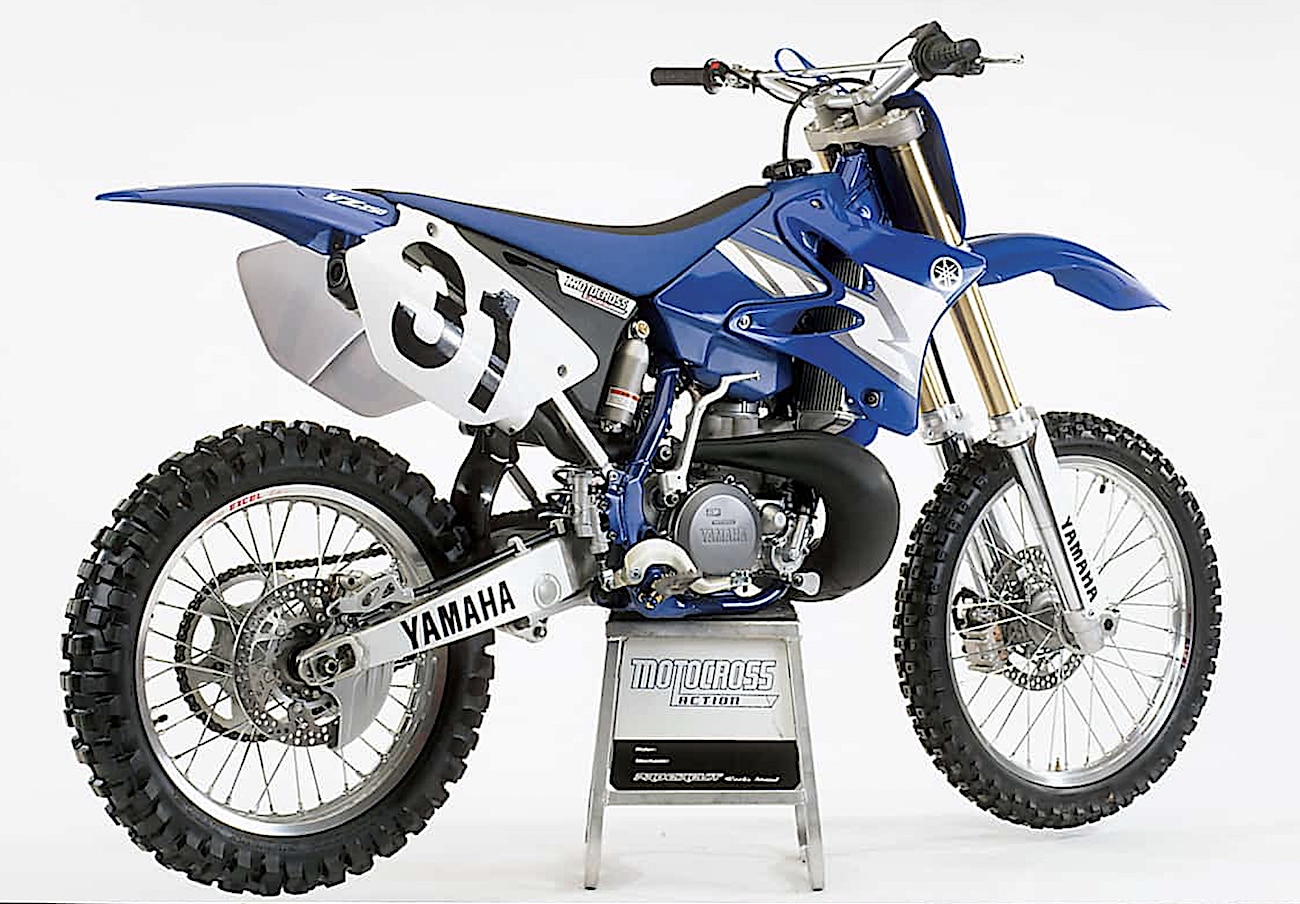

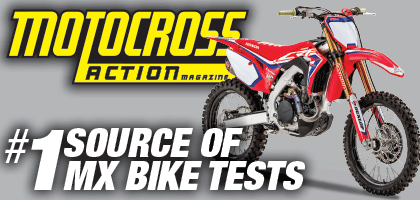


Comments are closed.